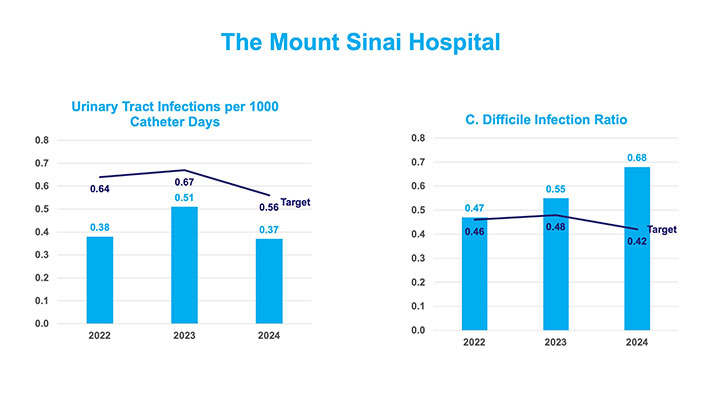
A healthcare-associated infection rate below the purple target line (the CMS National Target) means the hospital has fewer infections than at least half of the other hospitals in the country.
Healthcare-Associated Infections (HAI)
What is a Healthcare-Associated Infection (HAI)?
Healthcare-Associated Infections (HAI) are infections people get while receiving care in a hospital or other healthcare setting. The causes of the infections may be bacteria, viruses, or other pathogens. HAIs can be mild or life-threatening. Most HAIs can be avoided with infection prevention efforts. Catheter-associated urinary tract infection (CAUTI) and Clostridioides difficile (C. diff) are two types of HAIs.
Preventing harm related to HAIs is an important part of Mount Sinai’s patient safety program. Our goal is zero harm. To prevent HAIs, we care for every patient using proven prevention strategies. We also review every HAI as a team to learn how to prevent future events.
What is a Catheter-Associated Urinary Tract Infection (CAUTI)?
When patients are in the hospital, they may need to have small tubes called catheters placed in their urinary bladder. Urinary tract infections (UTI) are the most common type of HAI.
What is a Clostridioides difficile (C. diff) infection?
Clostridioides difficile or C. diff is a bacteria that causes diarrhea and inflammation of the colon. Most cases of C. diff occur after taking antibiotics. C. diff can be spread to other patients and precautions should be taken to minimize the spread. We aim to prevent the spread of infection through handwashing, management of antibiotics, and thorough and frequent cleaning.
How do we track HAIs?
We compare the number of HAIs that occurred to the number of days that all our patients spent in the hospital, or how many days they have a catheter in place to calculate rates. By reviewing the rates over time we can measure how well our prevention strategies are working.
How do we prevent HAIs?
We use several strategies to prevent infections and keep patients safe. Throughout our hospitals we have built programs to focus on prevention strategies that we know work to keep patients safe. Frequent and consistent hand washing is an essential step for all of our staff. We are dedicated to ensuring the proper care of catheters and IVs, which includes regular cleansing of the area and changing of dressings. We also seek to maintain a clean environment with regular cleaning and by disinfecting patient care areas.
How do we partner across hospitals to improve patient safety?
Our hospital representatives meet as a committee to talk about preventing HAIs. This committee reviews national best practices and evaluates our hospital programs. We incorporate what we learn to improve the patient care experience.